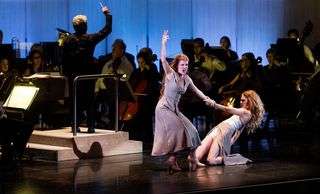|
Back
Another portrait of the 1930s Toronto
Roy Thomson Hall
06/14/2017 - & June 15, 2017
Andrew Balfour: Kiwetin-acahkos - Fanfare for the Peoples of the North
Samuel Barber: Adagio for Strings, Op. 11
Béla Bartók: Music for Strings, Percussion, and Celesta, Sz. 106
Kurt Weill: Die sieben Todsünden
Wallis Giunta (Anna I), Jennifer Nichols (Anna II), Isaiah Bell (Father), Owen McCausland, Geoffrey Sirrett (Brothers), Stephen Hegedus (Mother)
The Toronto Symphony Orchestra, Peter Oundjian (conductor)
Joel Ivany (stage director), Jason Hand (lighting designer), Krista Dowson (costume designer)

W. Giunta & J. Nichols (© Jag Gundu)
The TSO’s exploration of music from the 1930s continued with an American-Hungarian-German program.
Samuel Barber’s Adagio for Strings served to represent the emerging US contribution to the international music scene, and was given a strongly sustained, sensuously modulated build-up toward its high-tension climax.
The reduced orchestra was set up as two string orchestras for the evening, a configuration that really made its presence felt in Béla Bartók’s Music for Strings, Percussion, and Celesta. Peter Oundjian brought forth a wide dynamic range (as in the Barber work), and in the quieter passages one wished the hall could support more resonance. The ghostly sounds of the opening swelled up into an episode of tense anguish offset by the eerie sparkle of the celesta. The Allegro movement was appropriately muscular, and the Adagio, brooding. The finale (Allegro molto) was taken at a reckless pace, bounding toward the off-kilter finale. Overall, an exhilarating performance.
The key work of the evening was Kurt Weill and Bertolt Brecht’s mordant The Seven Deadly Sins given an expressive staging by the ever-resourceful Joel Ivany. He was credited as stage director but there was choreography on show as well, most likely worked out between him and dancer Jennifer Nichols who also voiced the few lines of Anna II. (Ms. Nichols also collaborated with Chris Monette on the filmed sequences that accompanied the surtitles.)
The role of Anna I must carry the show and Wallis Giunta’s voice and stage savvy resulted in a characterization that was ideal, as were Ms Nicholls’ movements as the victimized Anna II. The four men playing the manipulative family who admonish the Annas to steer clear of the sins so that they (the family) can wallow in them (especially sloth, gluttony, and covetousness), ably performed their stylized movements utilizing to the full the large front portion of the stage. The voices were amplified, but not egregiously so. It got an enthusiastic reception.
The evening opened with yet another “sesquie” celebrating the country’s sesquicentennial. Winnipeg-born Andrew Balfour’s Kiwetin-acahkos (“North Star”) is an evocation of the Canadian sky. For string orchestra plus just two horn players, this enticing snippet ends just when it starts to take off. “Pay me to create something longer” it seems to say. Hard to disagree.
Michael Johnson
|